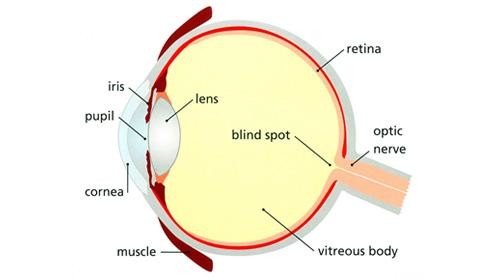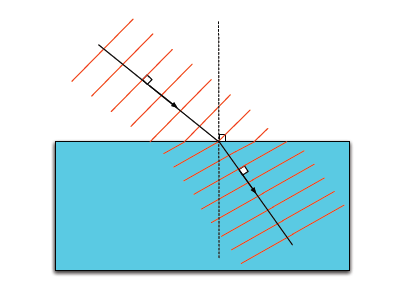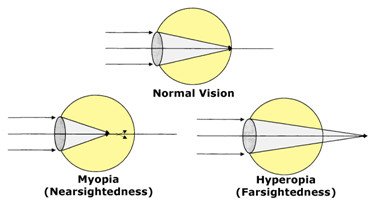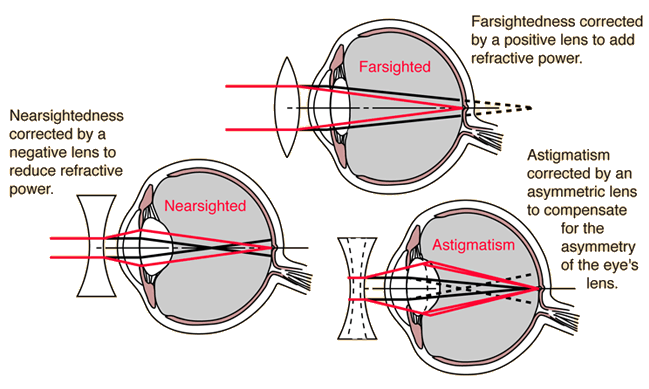Why We Need Glasses - The Physics
Many people live with less-than-perfect vision - around 75% of working adults in America use some form of vision correction, with the majority opting for glasses over contact lenses (https://www.thevisioncouncil.org/research). The two most common vision impairments requiring correction are myopia (near-sightedness) and hyperopia (far-sightedness).
So what causes them and why are they so common-place?
The Eye
Let's first take a look at how the eye works: light entering the pupil of the eye (the small aperture within the iris which opens and closes to control the intensity of light received by the inner eye) undergoes a refractive effect as it passes through the sharply curved cornea and through the crystalline lens before forming an image on the retina. The curvature of the lens is variable and controlled by ciliary muscles which 'squash' and 'stretch' the lens as necessary to focus an image.

To explain the term refractive effect (or refraction) we have to understand the meaning of a material's refractive index.
A wavefront of light passing from a material of lower refractive index to a material of greater refractive index slows down. If the wavefront approaches at an angle, one side will experience a change in speed before the other, resulting in a change of direction (refraction) towards a line perpendicular to the surface.

The cornea membrane has a greater refractive index than air, and the lens a greater index than the cornea. As such, light is 'bent' as it enters and the two function as a converging lens - near-parallel light rays incident to the eye are focused to a point on the retina. The greater the curvature of the cornea-lens system, the greater its refractive effect on incoming light.
Refractive Errors And Defects Of Vision
Problems arise when the effective refractive index of the cornea-lens system differs from what is required to converge light at the surface of the retina. Myopic (nearsighted) eyes are 'too long': the system is consistently too sharply curved and rays converge at a point before the retina. Conversely, hyperopic (farsighted) eyes are 'too short' for their under-curved cornea-lens system and the rays converge at a point behind (after) the retina.

In either case, the image formed is out of focus.
For a myopic eye, the closer the object in question (i.e. when the incoming rays can no longer be considered parallel) the lesser the refractive error. This justifies the term 'nearsighted' - there is a distance beyond which a viewed object is no longer in focus due to over-refraction.
A hyperopic eye experiences the least refractive error for a very distant object, since least refraction is required to focus the image. Decreasing the distance at which the object is viewed increases the amount of refraction required to focus, and the curvature-deficient cornea-lens system of a hyperopic eye fails to provide this additional refraction - hence the term 'farsighted'.
Lens Correction
Contact lenses and reading glasses work in the same way; both use a lens to compensate for an eye's refractive error.
A farsighted eye fails to sufficiently refract incoming light to a convergence point, and a converging lens of a pair of spectacles is used to artificially provide the deficient refraction. The sum of the refractive abilities of the two systems is such that the rays form precisely on the retina (in focus).
A nearsighted eye has the opposite problem - it systematically over-refracts incoming light. A diverging lens is used to compensate, and the image is similarly refocused.
Another relatively common defect, astigmatism, is caused by a non-uniform refractive index within the eye's lens. This is treated with an asymmetric spectacle lens (of varying refractive index throughout).

Knowledge of refractive indices of the eye and the nature of light is crucial for vision correction device manufacturers, and without it millions of people would struggle to carry out everyday tasks.
Fortunately, advancements in treatment have meant that diagnoses of minor vision impairment have little effect on quality of life in the western world.
Our Neanderthal ancestors on the run from predators would not have been so lucky!
If you enjoyed this article or are interested in all things science, follow my blog for daily doses of physics and chemistry, along with explanations for curious everyday phenomena.
References:
University Physics with Modern Physics, Volume 2 by Young and Freedman
https://www.thevisioncouncil.org/research
Great job man, and congrats on being on @OCD (-:
Thanks, appreciate the encouragement. More to come.
Perfect info.
Thanks!
Fantastic post buddy! I am a glasses wearer myself and it is interesting to know how they actually work to correct my vision. I would be keen to know if there are any lenses that can be used to correct macular degeneration, and if so how they function.
Lenses replicate the function of the lens/cornea system, whereas the macula has an altogether different function. As far as I am aware there is nothing about the nature of the classical lens that would resolve problems associated with macular degeneration. Hope that helps!
you reminded me of physics exercises at university!
Fingers crossed that's a good thing!
Congratulations @cjrc97! You have completed some achievement on Steemit and have been rewarded with new badge(s) :
Click on any badge to view your own Board of Honor on SteemitBoard.
For more information about SteemitBoard, click here
If you no longer want to receive notifications, reply to this comment with the word
STOPCongratulations @cjrc97! You have completed some achievement on Steemit and have been rewarded with new badge(s) :
Click on any badge to view your own Board of Honor on SteemitBoard.
For more information about SteemitBoard, click here
If you no longer want to receive notifications, reply to this comment with the word
STOPthanks for making this
No worries, thanks for reading.
Great. Thanks for sharing. I'm starting to follow you.
Thanks, stay posted for more!